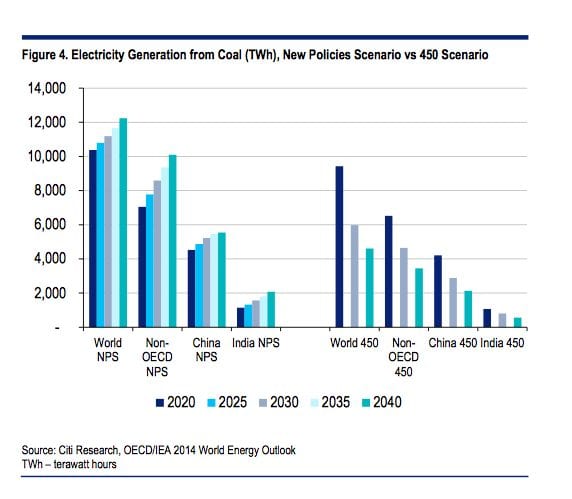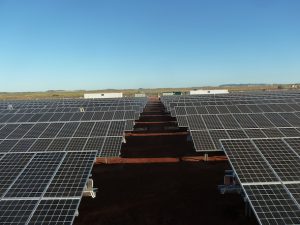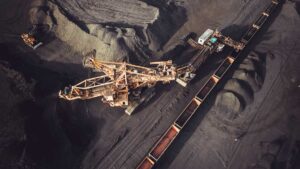Citigroup says the impact of the China-US climate deal signed earlier this month could total $US3.9 trillion ($A4.5 trillion) – that’s the loss in revenue for Big Oil and Big Coal over the next 15 years from the joint undertaking on greenhouse gas emissions by the world’s two biggest economies.
And in a stinging rebuke to the fossil fuel lobby, the Abbott government and conservative commentators, Citigroup analysts say that a carbon price in Australia is inevitable, suggests thermal coal is on a permanent decline, and that investments in infrastructure surrounding the Galilee basin contain significant risk.
It questions the viability of many oil projects, expresses doubt about carbon capture and storage, and punctures the big marketing ploy of Big Coal – happily echoed by the Abbott government – that coal is the answer to energy poverty, by saying that it will a strategy of “anything but coal”.
It also suggests that the Minerals Council of Australia is kidding itself if it thinks that it can count on large growth in the coal market based on the recent International Energy Agency’s New Policies Outlook, which Citi says has been made more or less redundant by the China- US development. The market for imported coal is likely to contract sharply.
The statements are included in it Climate Policy and Energy Outlook Developments published this week.
The analysis is important because it shows that it is not just left wingers, greenies and environmental NGOs that are thinking along these lines, and questioning the future of the fossil fuel industry. This issue is very much alive in mainstream financial markets, and as these analyses seep through to those who control the capital flows that govern international market, then the impact will be dramatic.
Citi’s global commodities team say the most tangible impact of the US-China climate deal will be a $US1.3 trillion revenue hit for Big Oil between now and 2030, and a $US1.6 trillion hit against Big Coal.
That is the loss in revenue compared with commonly used baseline assumptions, just for those countries – as oil demand growth rates slow as engines become more efficient and many go for electric vehicles, and renewable are used in place of coal.
But the impact could be greater if the world moves towards an agreement in Paris next year that sets it on a path to limit average global warming to 2C.
As for the Australian coal lobby, Citi slaps down the Minerals Council of Australia, which claimed earlier this month that the International Energy Agency’s World Energy Outlook 2014 suggested a 40 per cent lift in the coal trade, and that this would be “unambiguously positive” for Australian coal.
Citi says that that scenario is based on the “new policies” scenario which would allow for 3.6°C warming. The US-China deal indicates the world is moving beyond that. And, Citi notes that even modest changes to climate policy could mean large impacts on thermal coal.
“The outlook for thermal coal may be less “unambiguously positive” than the MCA suggests,” the Citigroup analysts write.
And on energy poverty in developing countries, Citi notes it has been a theme reiterated by a number of coal producers and industry associations in the course of 2014. This includes by BHP Billiton, the Minerals Council of Australia, and US coal producer Peabody.
But Citi says it questions whether coal will in fact play as significant a role as the coal industry may be suggesting in lifting developing nations out of energy poverty.
“Despite coal industry assertions that coal is required to lift developing nations out of energy poverty, we suspect that a variety of cleaner technologies will play a substantial role. Coal appears projected to play a minor role compared with hydro, gas, renewables and mini-grid/off-grid systems. To us, it looks almost like an “everything but coal” scenario,” it says.
Similarly, Citi says it remains unconvinced that the other great marketing ploy for Big Coal – large-scale commercial deployment of carbon capture and storage – will eventuate, simply because it will be too expensive and will likely lead to stranded assets.
The MCA made a big deal of CCS after the China-US deal, but Citi says:
“CCS projects would be major engineering ventures that would add significantly to the cost of coal fired generation, presumably therefore making coal use less competitive, and encouraging deployment of alternative low emissions solutions.
“The risk vs reward equation for private sector participants may be challenging. Progress with alternative technologies might offer lower cost solutions for reducing emissions before CCS project payback has been achieved, putting CCS projects at risk of “stranding”.”
All of this is bad news for Australia coal producers,. But Citi notes that majors such as Rio Tinto and BHP Billiton have relatively small exposures to thermal coal, compared to their overall portfolio.
However, companies such as Whitehaven are heavily exposed, and so to is rail haulage company Aurizon, which has 23 per cent of revenues relating to thermal coal.
That exposure could rise if it invests in the Galilee Basin thermal coal projects. Citi warns that . “Should Aurizon proceed with the project, we suspect investors will be interested in considering the project’s resilience to potentially weakening coal demand.”








